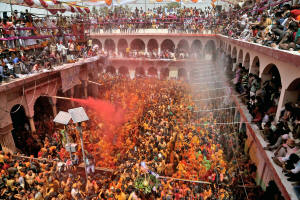Rallies, religious gatherings aggravate India's worst COVID-19 surge
 Send a link to a friend
Send a link to a friend
 [April 08, 2021]
By Krishna N. Das and Sachin Ravikumar [April 08, 2021]
By Krishna N. Das and Sachin Ravikumar
NEW DELHI (Reuters) - India's COVID-19
cases have soared 13-fold in barely two months, a vicious second wave
propelled by open disregard for safety protocols in much of the vast
country.
Election rallies led by Prime Minister Narendra Modi and other major
figures, as well as crowded festivals and religious gatherings, have
characterised the record resurgence of the new coronavirus.
After quelling the first surge late last year, India's leaders let down
their guard. Allowing or even encouraging dangerous behaviour, they
underestimated the virus, reopening the economy too fast and too
broadly, experts say.
With daily infections hitting a record 127,000 on Thursday, the most in
the world and the third day this week over 100,000, the third-hardest
hit country is soaring past its mid-September peak of around 98,000
cases a day.

Days after the health minister declared India's COVID-19 outbreak
contained in late January, Mumbai reopened its massive suburban train
network and authorities let tens of thousands of visitors into stadiums
for international cricket matches.
Many of the South Asian nation's 1.35 billion people ignored masks and
social distancing, while politicians including Modi and Interior
Minister Amit Shah greeted hundreds of thousands of mostly mask-less
supporters at election rallies.
When daily infections fell below 10,000 in early February, some experts
predicted India would see only a modest second wave at most.
"We were really premature to celebrate," said University of Michigan
epidemiologist Bhramar Mukherjee.
"This is a lesson," said Mukherjee, who leads a team of researchers
modelling the trajectory of India's outbreak. "The really treacherous
thing about this virus is how silently it casts its footsteps. By the
time you see the cases and deaths, the damage is done."
Health Minister Harsh Vardhan told officials of 11 of the worst-hit
states this week that "people largely gave up on COVID-appropriate
behaviour, became very careless" as activity resumed.
"There have been elections, religious gatherings, reopening of offices,
lots of people travelling, attending social functions, not following
rules, little mask-wearing in functions like weddings, even on crowded
buses and trains," he told a video conference.
Vardhan himself has faced criticism for tweeting dozens of images and
videos of party rallies.
[to top of second column]
|

Hindu devotees take part in 'Huranga', a game played between men and
women a day after Holi, the festival of colours, at Dauji temple
near the northern city of Mathura, India, March 30, 2021. REUTERS/K.
K. Arora/File Photo

With 12.9 million cases, India remains close behind Brazil and well
below the United States, which has recorded more than 30 million
infections. India's COVID-19 deaths are above 166,000, although its
fatality rate is one of the lowest in the world, partly because of
its relatively young population.
New Zealand on Thursday suspended entry for all travellers from
India, including its own citizens, for about two weeks.
Authorities have imposed some curbs on movement, but federal
ministers and industrialists have advised against another national
lockdown. Last year's curbs thrashed the economy and threw millions
of poor people out of jobs.
Instead, an increasing number of states are imposing local curbs,
including night curfews in mega-cities such as Delhi and Mumbai.
Authorities have refused to call off a weeks-long Hindu festival,
held once every 12 years on the banks of the Ganga river in the
northern state of Uttarakhand.
A successfully run Mahakumbh, which is expected to draw millions of
devotees, is seen as crucial for the campaign of Modi's Hindu
nationalist party in the state, which votes next year.
Political parties have largely flouted COVID-19 rules during
campaigns for multi-phase elections in four big states and one
federal territory that started last month.
"Political leaders are themselves responsible" for the resurgence by
allowing the packed rallies, said Subhash Salunke, a former World
Health Organization official who advises the worst-hit state,
Maharashtra. "The upward trend is going to be there for another
couple of weeks."
Shashank Tripathi, a professor at the Centre for Infectious Disease
Research at the Indian Institute of Science in Bengaluru, said that
even if most people are eventually exposed to the virus, "there is
no guarantee that it will not come back and infect you again."

"The lesson is the same for any country."
(Reporting by Krishna N. Das in New Delhi and Sachin Ravikumar in
Bengaluru; Additional reporting by Neha Arora; Editing by William
Mallard)
[© 2021 Thomson Reuters. All rights
reserved.] Copyright 2021 Reuters. All rights reserved. This material may not be published,
broadcast, rewritten or redistributed.
Thompson Reuters is solely responsible for this content. |